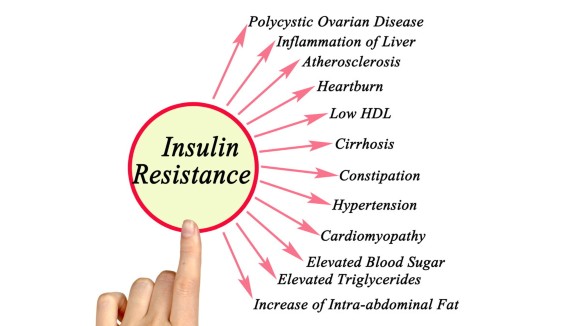
The Importance of Fighting Insulin Resistance: A Vital Health Concern
 Struggling with pre-diabetes or stubborn belly fat? The Insulin Resistance Solution by Dana Carpender offers a practical guide to reversing insulin resistance, repairing your metabolism, and preventing diabetes. With over 75 delicious, easy-to-follow recipes, you'll learn how to take control of your health, shed unwanted weight, and enjoy balanced blood sugar. Start your journey to a healthier you today!
Struggling with pre-diabetes or stubborn belly fat? The Insulin Resistance Solution by Dana Carpender offers a practical guide to reversing insulin resistance, repairing your metabolism, and preventing diabetes. With over 75 delicious, easy-to-follow recipes, you'll learn how to take control of your health, shed unwanted weight, and enjoy balanced blood sugar. Start your journey to a healthier you today!
We may earn from qualifying purchases made through links on this site.
Thank you for your support!
Insulin resistance occurs when the body's cells become less responsive to insulin, a hormone produced by the pancreas that helps regulate blood sugar (glucose) levels. Under normal circumstances, insulin allows cells to absorb glucose from the bloodstream to use for energy or store for later use.
In the case of insulin resistance, the cells don't respond as effectively to insulin. As a result, the pancreas produces more insulin to compensate and help keep blood sugar levels stable. Over time, this excess insulin production can lead to elevated blood sugar levels (hyperglycemia) and eventually to type 2 diabetes if the pancreas can no longer keep up.
Insulin resistance is often associated with conditions like obesity, physical inactivity, poor diet, and genetics. It can also be a component of metabolic syndrome, a group of conditions that increase the risk of heart disease, stroke, and type 2 diabetes. Managing insulin resistance typically involves lifestyle changes such as improving diet, increasing physical activity, and sometimes using medications.
1. Key Role in Metabolism:
Insulin is a hormone produced by the pancreas that plays a crucial role in regulating blood sugar levels and facilitating the uptake of glucose by cells for energy. Insulin resistance disrupts this process, leading to elevated blood sugar levels and potential long-term complications like type 2 diabetes.
2. Risk of Type 2 Diabetes.
Insulin resistance is a major risk factor for the development of type 2 diabetes. When the body's cells resist the action of insulin, the pancreas compensates by producing more insulin. Over time, this can lead to pancreatic exhaustion and the inability to maintain normal blood sugar levels, resulting in diabetes.
3. Impact on Cardiovascular Health.
Insulin resistance is closely linked to an increased risk of cardiovascular diseases like heart attacks and strokes. Elevated insulin levels can contribute to inflammation, high blood pressure, and adverse changes in cholesterol levels, all of which are risk factors for heart disease.
4. Weight Management Challenges:
Individuals with insulin resistance often struggle with weight management. Insulin resistance can lead to increased fat storage, especially in the abdominal area, making it harder to lose weight and maintain a healthy body composition.
5. Energy Levels and Fatigue.
Fluctuating blood sugar levels due to insulin resistance can result in energy crashes and feelings of fatigue. The body's inability to efficiently use glucose for energy can lead to decreased energy levels and overall lethargy.
6. Long-Term Health Complications:
Chronic insulin resistance can have far-reaching effects on health, increasing the risk of developing conditions such as metabolic syndrome, polycystic ovary syndrome (PCOS), non-alcoholic fatty liver disease, and certain types of cancer.
7. Lifestyle Modifications and Prevention.
Addressing insulin resistance through lifestyle modifications, including a balanced diet, regular exercise, stress management, and adequate sleep, can help improve insulin sensitivity and reduce the risk of associated health conditions.
Empowering Personal Health
By proactively addressing insulin resistance, individuals can take control of their health and well-being, reducing the likelihood of developing serious health issues and improving their overall quality of life.
Fighting insulin resistance is not just about managing blood sugar levels; it is a vital step in safeguarding long-term health and preventing a cascade of metabolic and cardiovascular complications. Prioritizing strategies to combat insulin resistance can pave the way for a healthier, more vibrant future and empower individuals to take charge of their health journey.
Strategies to Combat Insulin Resistance
Insulin resistance can be effectively managed and even reversed through lifestyle changes and targeted interventions. Here are several effective ways to fight insulin resistance:
1. Healthy Diet Choices:
- Emphasize Whole Foods: Include plenty of nutrient-dense whole foods such as vegetables, fruits, lean proteins, whole grains, and healthy fats in your diet.
- Limit Processed Foods: Minimize intake of processed foods high in refined sugars, unhealthy fats, and additives that can contribute to insulin resistance.
- Control Carbohydrate Intake: Opt for complex carbohydrates with a lower glycemic index to help regulate blood sugar levels and insulin response.
2. Regular Physical Activity:
- Aerobic Exercise: Engage in regular aerobic activities like walking, cycling, or swimming to improve insulin sensitivity and lower blood sugar levels.
- Strength Training: Incorporate strength training exercises to build muscle mass, which can enhance glucose uptake and insulin sensitivity.
3. Weight Management:
- Lose Excess Weight: Maintain a healthy weight through a combination of a balanced diet and regular exercise to reduce the strain on insulin-producing cells.
- Focus on Abdominal Fat: Target reducing visceral fat around the abdomen, as excess abdominal fat is strongly associated with insulin resistance.
4. Stress Reduction:
- Practice Stress-Relieving Techniques: Incorporate stress management techniques such as meditation, deep breathing exercises, yoga, or mindfulness to lower stress hormone levels that can contribute to insulin resistance.
5. Adequate Sleep:
- Prioritize Quality Sleep: Aim for 7-9 hours of quality sleep each night to support overall health and hormone regulation, including insulin sensitivity.
6. Hydration:
-Drink Plenty of Water: Stay hydrated throughout the day as dehydration can affect blood sugar levels and insulin function.
7. Intermittent Fasting:
- Consider Fasting Protocols: Intermittent fasting regimens, such as time-restricted eating or alternate-day fasting, have shown to improve insulin sensitivity and metabolic health.
8. Medical Supervision:
- Consult Healthcare Providers: Seek guidance from healthcare professionals, such as doctors, dietitians, or endocrinologists, to create a personalized plan for managing insulin resistance.
By implementing these strategies and adopting a holistic approach to health and well-being, individuals can effectively combat insulin resistance, improve insulin sensitivity, and reduce the risk of developing metabolic disorders associated with insulin resistance. Consistency and commitment to healthy lifestyle habits are key to successfully managing insulin resistance and optimizing overall health.
Read this next
-
The Lost Gospels?

Bishop Athanasius of Alexandria wrote in the fourth century C.E. that the Christian apocrypha—texts that refer to the life of Jesus and his followers that are not included in the New Testamen
-
Why I chose a Vegetarian diet

The food we consume plays a significant role in our overall health and well-being. Animal products are a common part of many people's diets, but how do they truly affect our health?
